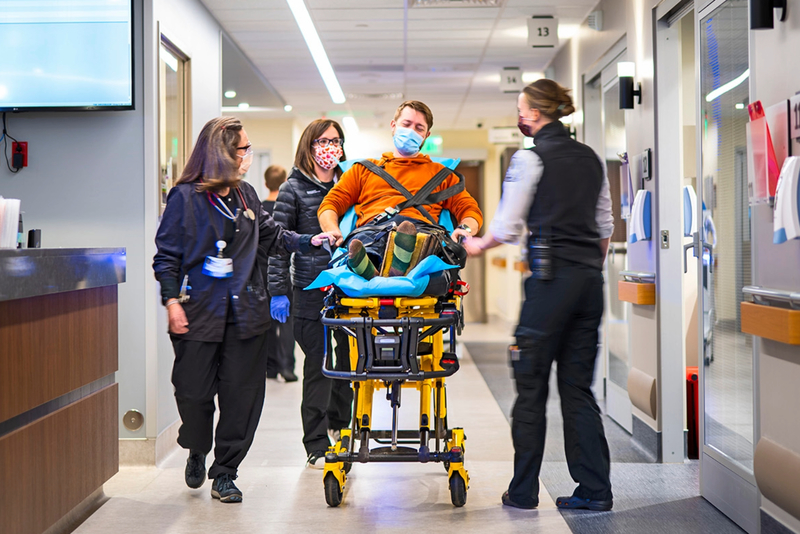News
Where To Go For Care
Dr. Kendrick Adnan, Urgent Care Medical Director
May 01, 2024

When to go to the Emergency Department, Urgent Care or Primary Care Provider
So, you fell skiing and woke up the next day with knee pain. Your child has a low-grade fever and mild cough. You are in your 70s and start having chest pain. In the event of illness or injury, it’s sometimes hard to know where to go for care.When to go to the Emergency Department
Those with multiple or complex medical problems with symptoms that are rapidly getting worse should call 9-1-1 or go to the Emergency Department (ED) right away. Life- or limb-threatening issues and those who require immediate diagnostics and stabilization should also be treated in an ED. Vail Health’s Emergency Department is open 24 hours/day, seven days/week. The Emergency Department is staffed by specially trained physicians, nurses and support staff to diagnose and treat conditions that require immediate attention. The Emergency Department can get immediate results on advanced imaging like CT, ultrasound and some emergently needed MRIs. They have complex laboratory resources needed to diagnose and deliver care for severe and life-threatening situations. The team also has quick access to expert specialists. Certain health conditions may need specialized care and treatment; in that case, the ED team will stabilize patients and transport them safely to a partner facility. The Emergency Department is typically the most expensive level of care. Patients are treated based on the severity of their condition, not when they arrive for care.When to go to Urgent Care
When you can’t wait for an appointment with a Primary Care Provider (PCP), urgent health care needs should be addressed in an Urgent Care. Those with minor illnesses or injuries and without other severe symptoms or underlying health conditions can be treated promptly by an Urgent Care provider. Colorado Mountain Medical offers Urgent Care clinics in Dillon, Vail, Avon and Eagle. They are staffed by physician assistants, nurse practitioners and sometimes a doctor. Urgent care providers can order basic labs and x-rays, and the results are typically available within 15-20 minutes. Other more advanced imaging like CT, ultrasound and MRIs need to go through insurance authorization and require scheduling. Urgent Cares are typically more affordable than the Emergency Department.When to go to Primary Care
Primary care is the best option for those with multiple or chronic medical problems that need follow-up and can wait for an appointment. Primary Care Providers (PCPs) know their patients well and consider personal and family history, recent diagnoses and personal health goals. An annual wellness visit with a PCP is recommended to establish care before issues arise. PCPs monitor their patients’ overall wellness and can recommend adjustments to ensure they reach their health care goals. If you are seen by the Emergency Department or Urgent Care, it is important to follow up with your PCP to ensure you are recovering appropriately and do not need further treatment. Primary care is typically the least expensive option for care.Examples of the types of conditions treated at each level of care are outlined as follows.
Emergency Department:
- Chest pain/pressure or palpitations
- Compound fracture (bone that protrudes through the skin) or dislocated joints
- Seizures
- Severe abdominal pain
- Severe shortness of breath
- Sudden, severe headache, slurred speech, weakness or numbness
- Uncontrolled bleeding
- Vision problems, such as double vision or loss of vision
- Severe dizziness
- Head injury with severe symptoms, loss of consciousness, fainting, confusion or seizures
- Large burns with blisters
- Larger cuts that may require stitches
- Fever over 103 degrees with or without rash
- Poisoning
- Mental health crisis
- Fainting/change in mental state
- Severe cold or flu symptoms
- Severe vaginal bleeding with or without pregnancy
Urgent Care:
- Back or muscle pain
- Non-bloody vomiting and/or diarrhea
- New onset skin conditions
- Sprains, strains or new onset joint pain
- Upper respiratory, flu symptoms, sore throat or ear pain
- Urinary tract infections or painful urination
- Mild wheezing or mild shortness of breath
- Minor burns without blister
- Small cuts that may need stitches
- Eye discharge
- Animal or insect bite
- Minor allergic reactions
- Minor head injury with mild symptoms
- Altitude sickness
Primary Care
- Chronic or recurrent respiratory and urinary tract infections
- Persistent cough, cold, fever and flu symptoms
- Minor cuts and burns
- Minor fractures, strains and sprains
- Chronic or recurrent stomach illness
- Chronic or recurrent pain or joint problems
- Chronic or recurrent allergies
- Chronic or recurrent back or muscle pain
More News
-
More

The Benefit of Doing Hard Things
How Creating Resiliency Impacts Long-Term Health I had just returned from my first Hyrox, a fitness race...
-
More

Spring Is in the Air, And So Are Allergens—How to Combat Spring Allergies
For some of us, April marks the end of the ski season. For allergy specialists like me, it means the beginning of a...
-
More

The 3 Cs of Measles
Recent news reports on measles outbreaks have brought the once-dormant disease to the forefront of many...





